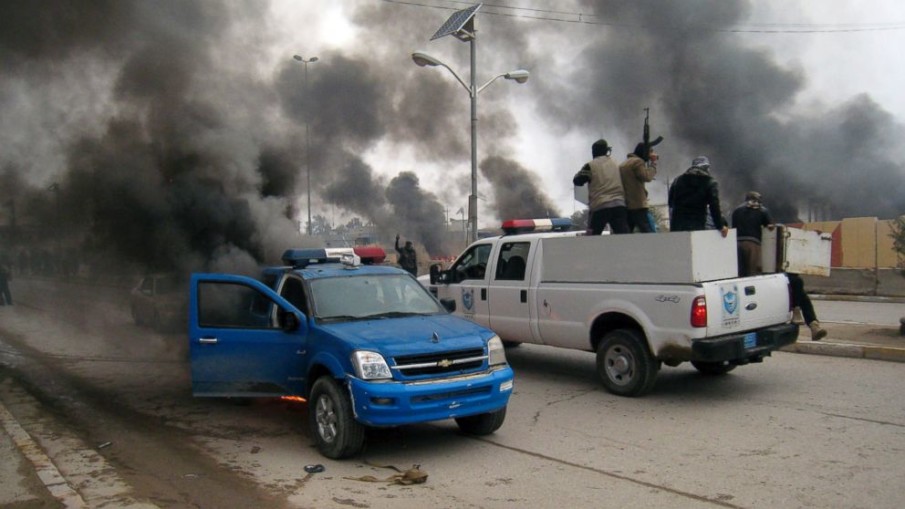Following the Iraqi government breakup of a Sunni protest camp in Ramadi on Dec 30, fighting erupted in Fallujah, with the Islamic State in Iraq and al Sham seizing the southern half of the city. The black Al Qaeda battle flags now fly from government buildings in Fallujah. The Iraqi government is saying that the other half of the city is controlled by “tribesmen,” who are nonetheless allied with ISIS. The mosques are once again being used to issue a call to arms to the young men of the city to join the jihad.
In Ramadi, fighting has been more intense, as some of the Sahwa militias appear to be resisting the ISIS fighters and their allies. Government troops shelled Fallujah on Jan 3, attempting to dislodge the ISIS forces, and there are reports of Iraqi Special Operations Forces in the city fighting ISIS and their allies. More of Fallujah’s inhabitants have fled to ISIS-controlled parts of the city, attempting to avoid the shelling. There are reports of ISIS snipers set up in empty buildings throughout the city.
Long War Journal reports that the names of the tribes allied with ISIS in Fallujah have not been reported, but during the height of AQI’s insurgency in the city, the Zobai and Fuhaylat sub-tribes of the Albu Issa were the primary supporters of the Al Qaeda affiliate. It seems likely that the same tribes have reverted to their previous loyalties, and with the shelling and the Shi’a-centric nature of the Iraqi government, it does seem likely that more may follow. The whole of Al Anbar Province has been descending in to violence lately, as the majority Sunni province increasingly believes that the Shi’a-majority government is marginalizing the Sunni.
There has been fighting in Karma, and the Iraqi Army says they are preparing for operations to clear Haditha, Rawa, Anah, and Al Qaim. Those familiar with the past campaigns in Iraq will recognize the names, especially Karma, which was a major trouble spot for a long time. It appears nothing has really changed.
Sunni tribes outside the cities are attempting to rally the Sahwa again. According to Al Arabiya TV, the head of the Dulamyi tribal federation “has called on all tribes in Anbar to carry weapons and stand beside the Armed Forces to combat the remnants of the terrorists al Qaeda and the ISIS, protect police centers and expel terrorists from them, and give information about infiltrators among the tribes.” How effective this will be remains to be seen.
ISIS changed its name from “The Islamic State in Iraq” to “The Islamic State in Iraq and al Sham” last year, in an attempt to bring the Al Nusra Front, which was started as an affiliate of ISI, under its control. ISIS hasn’t had a lot of luck with their expansion, having met resistance from Al Nusra, and now the Jabhaat Islamiya. However, the growing Sunni-Shi’a conflict that has taken over the Syrian Civil War has, predictably, fully spilled over into western Iraq.
In spite of claims to the contrary, and the relative quiet in 2008-2009, AQI and the other Islamist insurgent groups were never eliminated; they had too many safe havens to run to when things got hot, and too many fighters and bomb-makers were released within weeks of their capture. Their resurgence cannot be honestly claimed as a surprise. Furthermore, the Iraqi government left in control was too weak and riven by sectarian and tribal rivalries, with security forces that have been anything but up to the task, as demonstrated in the violence leading up to elections last spring (while the US was horrified by 2 deaths in the Boston bombings, over 300 Iraqis were killed that week, including 13 candidates in the elections), and now with two major cities being taken or hotly contested by ISIS. Of course, anyone who worked with the IA could have seen that coming, as well.
Already have an account? Sign In
Two ways to continue to read this article.
Subscribe
$1.99
every 4 weeks
- Unlimited access to all articles
- Support independent journalism
- Ad-free reading experience
Subscribe Now
Recurring Monthly. Cancel Anytime.











COMMENTS